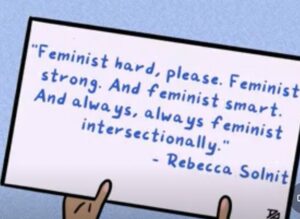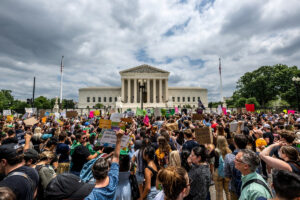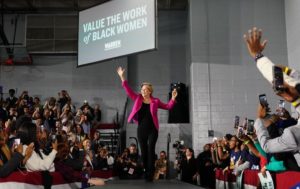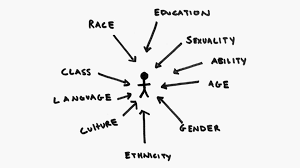Intersectionality
“Today’s Supreme Court decision is wrong.”
June 24, 2022“With sorrow — for this Court, but more, for the many millions of American women who have today lost a fundamental constitutional protection — we dissent.”
-Justices Breyer, Sotomayor, and Kagan
❧
Progress isn’t always a straight line.
Today’s Supreme Court decision is wrong
but Congress passing the Bipartisan Safer Communities Act is a modest but real step forward. And the fight will go on, thanks to the activists, survivors, and families who continue to demand action.
Today, the Supreme Court not only reversed nearly 50 years of precedent, it relegated the most intensely personal decision someone can make to the whims of politicians and ideologues—attacking the essential freedoms of millions of Americans.
-President Barack Obama
♡ ‘Culture of Care’ @AnaMariaforNY
Timeline: America’s Long Civil Rights March
By Nikole Hannah-Jones and Al Shaw, ProPublica
[2013]
Ever since the War of the States, Congress and the Supreme Court have clashed over the question of civil rights. When considering the recent rulings on affirmative action, the Voting Rights Act and the Defense of Marriage Act, it is useful to take the long view of the push and pull between Congress and the Supreme Court when it comes to civil rights. The long arc of history might bend toward justice, but there’s always been a lot of pendulum swinging along the way.
https://projects.propublica.org/graphics/vra
GALLUP
WASHINGTON, D.C. — With the U.S. Supreme Court expected to overturn the 1973 Roe v. Wade decision before the end of its 2021-2022 term, Americans’ confidence in the court has dropped sharply over the past year and reached a new low in Gallup’s nearly 50-year trend. Twenty-five percent of U.S. adults say they have “a great deal” or “quite a lot” of confidence in the U.S. Supreme Court, down from 36% a year ago and five percentage points lower than the previous low recorded in 2014.
Abortion is a fundamental right for all women. It must be protected. I wish to express my solidarity with the women whose liberties are being undermined by the Supreme Court of the United States.
-French President Emmanuel Macron
P
E
A
C
E
Non-violence.
K
I
N
D
The Kindness Bonus
Seth Godin
“Please be kind” sounds like a moral imperative. And in some ways, it is.
But behind the theory of the firm and a key building block of successful communities is the idea that kind interactions are significantly more productive.
When people feel seen and respected, they’re more likely to focus on what needs to be done, instead of taking umbrage or being defensive.
When we leave opportunities and pathways for others, they can move forward with less friction.
And when we’re enjoying our days, we’ve created a posture that spreads.
Hockey games aren’t supposed to be kind. But just about everything else works better when we don’t throw elbows.
“CARE is the antidote to violence.”
– Saidiya Hartman
From Jon Meacham’s podcast today, June 24th, 2022
On June 24th, 1990, The Catholic Church discusses excommunicating politicians who disagree with the church on abortion rights.
Important listen for history, and in this moment.
Reflections of History
From former Governor Mario Cuomo in 1984, at Notre Dame:
“I speak here as a politician and also as a Catholic, raised as a Catholic, pre-Vatican II church, educated in Catholic schools, attached to the church first by birth and then by choice, now by love. […] The Catholic church is my spiritual home. My heart is there. And my hope. The Catholic who holds political office in a pluralistic democracy, who was elected to serve Jews and Muslims, atheists, and protestants, as well as Catholics, bear special responsibility. He or she undertakes to help to create conditions under which all can live with a maximum of dignity and with a reasonable degree of freedom. Where everyone who chooses can hold beliefs different from specifically Catholic ones, sometimes contradictory to them, with laws that protect people’s rights to divorce, use birth control, and even to choose abortion. I protect my right to be a Catholic by preserving your right to believe as a Jew, a protestant, or non-believer, or anything else you choose. I accept the church’s teaching on abortion, must I insist you do, by law? By denying you Medicaid funding, by a Constitutional amendment? If so, which one? Would that be the best way to avoid abortions, or prevent them? […] We should understand whether abortion is outlawed or not, our work has barely begun. The work of creating a society where the right to life doesn’t end at the moment of birth. Where an infant isn’t helped into a world that doesn’t care if it’s fed properly, housed decently, educated adequately.”
“Search for the means of grace, and the hope of glory.” -Jon Meacham
S A N C T U A R Y
California Governor Gavin Newsom:
Abortion is legal in California.
It will remain that way.
I just signed a bill that makes our state a safe haven for women across the nation.
We will not cooperate with any states that attempt to prosecute women or doctors for receiving or providing reproductive care.
—
Canadian Prime Minister Justin Trudeau
The news coming out of the United States is horrific. My heart goes out to the millions of American women who are now set to lose their legal right to an abortion. I can’t imagine the fear and anger you are feeling right now.
—
Signal App post today on twitter:
@signalapp
Here is your friendly reminder that we built Signal for private, secure communication. It’s built so you can communicate individually and in groups, through text and calls, without fear of interference or data collection. Free to use and not for profit.
#protectwomen ♀
Warren gets it. Love, women, and intersectionality.
February 24, 2020‘I love my country, I love it very much. It is for that reason I do not makes excuses for it. If we think installing a hero is going to solve our problems, here is my warning now.
It won’t.
We NEED to BE the hero we seek in elected officials. Or else round and round we go.’
~Deina @sapereaude86
‘Political discourse is my Assignment. America is my Station. Love is my Religion’
‘Throughout her campaign, Warren has shown her ability to use intersectional approaches to analyze a wide variety of social ills & her engagement with this paradigm has only gotten richer as her campaign has progressed.’ By far, the best candidate for president.
Elizabeth Warren Is Running an Unapologetically Intersectional Campaign
As much as I want Medicare for All and for the rich to pay higher taxes, that won’t cure sexism. Warren gets that.
Another lesson of intersectionality has to do less with analysis and theory than with what we may call a politics of respectful attention. Taking intersectionality seriously means moving beyond merely acknowledging one’s own privilege and understanding that walking the walk entails listening to and learning from those who live in identities different from your own. Warren has exhibited this repeatedly, chiding other Democrats for only engaging with the black community during election time. Conversely, she met with Ta-Nehisi Coates—years before she became a presidential candidate—to learn from him following his explosive writing on reparations.
As Nelini Stamp writes in the newly radical Teen Vogue, “Elizabeth Warren is paying attention…. Her [environmental justice] plan is informed by the 17 Principles of Environmental Justice, an equity-based framework written by activists of color in 1991 that no presidential administration has acted on to date. Not anymore. Warren centers marginalized communities again and again in her plan.” And when Warren reads off the names of murdered trans women (not at a LGBTQ event!) and pledges to do so every year in the Rose Garden, she “brings the margin to the center” as bell hooks put it, making visible the ways in which race, class, gender, sexuality live in particular bodies in particular ways.
Being intersectional also means having to own up to mistakes, learn from those who live and love differently from you, step aside when necessary and step up when the situation dictates it. At a presidential forum on Native American issues in August, Warren addressed her own errors. “Like anyone who’s being honest with themselves, I know that I have made mistakes,” said Warren, presumably referring to her release of a DNA test purporting to show that she had Native American ancestry. “I am sorry for harm I have caused. I have listened and I have learned a lot, and I am grateful for the many conversations that we’ve had together.”
The key to robust intersectional thinking is to concretely demonstrate the ways in which things that seem to be about one concern are often inflected through others.
§ As Warren herself said in a tweet outlining her disability rights platform, “All policy issues are disability policy issues, which is why I’ve approached many of my previous plans with a disability rights lens, from criminal justice reform to ensuring a high-quality public education for all, to strengthening our democracy.”
§ When Warren addresses the debate about guns and links it to domestic violence, she is signifying precisely how a different angle of vision illuminates the connection between a culture of unfettered access to guns and a culture of violence against women.
§ During the New Hampshire debate, as the candidates discussed racial inequities in criminal justice and in wealth acquisition, Warren pointed out how her proposal to levy a wealth tax is not a simple “class” issue but in fact would address racial inequality in substantive ways by, for example, getting rid of student debt that unduly burdens people of color, who tend to be more in debt and take longer to pay it back.
§ On abortion, Warren made sure to point out the class and race dimensions, stating that if Roe v. Wade gets overturned, the rich (who are largely white) will continue to have access to reproductive services, while poor women and women of color will suffer.
§ She pivoted to condemn our history of discriminatory housing practices and make the point about the various ways in which racism informs pretty much everything, insisting that we can’t relegate “race” questions to some narrow aperture of vision.
§ In her plan on “Valuing the Work of Women of Color” (yes, she actually has a plan for that—a claim no other candidate can make), Warren acknowledges how the interplay of sexual and gender identities (as well as ability) with racial identities can exacerbate the obstacles women of color face.
§ In her plan on securing LGBTQ equality she highlights the connections between LGBTQ oppression and homelessness and increased risk of incarceration.
§ When discussing how to honor and empower Native people, she points out the centrality of anti-violence work for indigenous women who often go unprotected due to conflicts of tribal and federal governance.
[full read]
https://www.thenation.com/article/politics/elizabeth-warren-intersectional-campaign/
In lieu of SNL debate recap. #TikTok
https://t.co/eUMOKQ2xcEhttps://twitter.com/theferocity/status/1231936042346983424?s=20
Crossroads of identity.
June 11, 2018As we saw earlier this year, humans need concrete and particular experiences to learn the ways of love. We don’t learn to love through abstract philosophy or theology. That’s why Jesus came to show God in human form, revealing a face we could recognize and relate to. Let’s first call justice giving everything its full due. Thus, it must begin with somehow seeing the divine (ultimate value) in the other. If we really see someone in their fullness, we cannot help but treat them with kindness and compassion.
Even as we know that every human’s being is inherently and equally good, dignified, and worthy of respect, we cannot ignore our very real differences. The problem is that the ego likes to assign lesser and greater value based on differences. Until all people everywhere are treated with dignity and respect, we must continue calling attention to imbalances of privilege and power. Arbitrary, artificial hierarchies and discrimination are based on a variety of differences: for example, gender, sexuality, class, skin color, education, physical or mental ability, attractiveness, accent, language, religion, and so on.
“Intersectionality” is a rather new concept for most of us to help explain how these attributes overlap. You can be privileged in some areas and not in others. A poor white man has more opportunities for advancement than a poor black man. A transgender woman of color has an even higher risk of being assaulted than a white heterosexual woman. Someone without a disability has an easier time finding a job than an equally qualified candidate who has a disability.
Pause for a moment and think about the areas in which you benefit, not because of anything you’ve done or deserve but simply because of what body you were born with, what class privilege you enjoy, what country or ethnicity you find yourself in.
In the book Intersectionality in Action, experienced educators recognize that “admitting one’s privilege can be very difficult,” especially for those who consider themselves tolerant and prefer to not use labels, “calling themselves color-blind, for instance.”
When we finally recognize our unearned benefits—at the expense of others—we may feel ashamed and that may lead us to make excuses for ourselves or overly identify with a less privileged aspect of our identity (for example as Jewish or female). Yet as we move beyond these attachments and emotions, “[We] learn that [our] privileges and disadvantages can coexist, intersect, and impact the way [we] move through different environments.”
We must work to dismantle systems of oppression while at the same time honoring our differences and celebrating our oneness!
Our differences must first be maintained—and then overcome by the power of love.
Infinite Love preserves unique truths, protecting boundaries while simultaneously bridging them.
-Richard Rohr, Center for Action
BIONEERS
•compound racism
•intersectionality
•justice vs status quo
•women’s leadership
‘When the current president rode a wave of white anxiety into the White House in 2016, it was part of a backlash to the Obama presidency, one that revealed an increasingly explicit white nationalism and revived an overtly exclusionary agenda: roll back rights and protections for people of color, immigrants, Muslims, women, and gay and transgender people. Then came the backlash to the backlash: a rapidly spreading awakening that all these peoples, movements and struggles are actually connected in one story. Visionary law professor and change-maker Kimberlé Crenshaw shows that it’s only at the crossroads of our many identities that will we will find a story big enough to embrace the diversity and complexity of our globalized 21st century world.’





